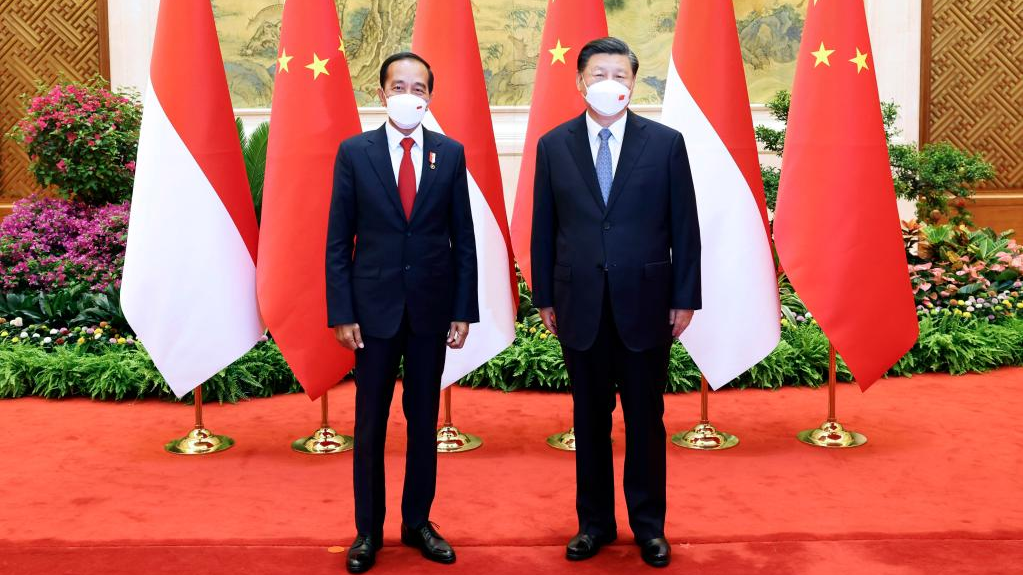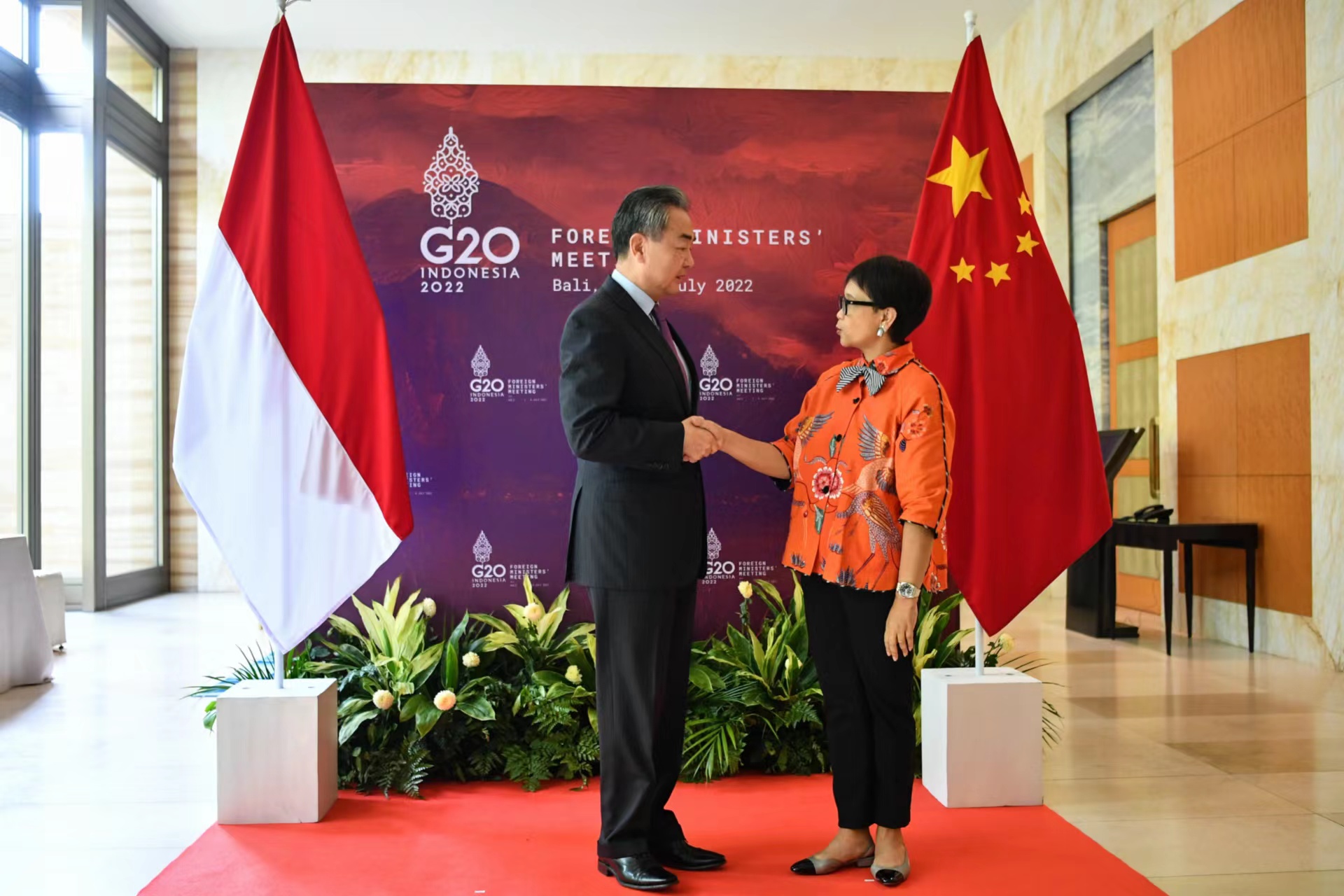
Chinese President Xi Jinping (R) holds talks with visiting Indonesian President Joko Widodo at the Diaoyutai State Guesthouse in Beijing, capital of China, July 26, 2022. /Xinhua
Chinese President Xi Jinping (R) holds talks with visiting Indonesian President Joko Widodo at the Diaoyutai State Guesthouse in Beijing, capital of China, July 26, 2022. /Xinhua
Editor's note: Hamzah Rifaat Hussain, a former visiting fellow at the Stimson Center in Washington and former assistant researcher at the Islamabad Policy Research Institute, is a TV anchor at Indus News in Pakistan. The article reflects the author's opinions and not necessarily those of CGTN.
Chinese President Xi Jinping and his Indonesian counterpart Joko Widodo reached mutual understandings and issued a joint statement in Beijing on July 26, seeking to promote joint visions for peace, prosperity, economic resilience and reaping benefits of multilateralism.
They laid a solid platform for meaningful strategic cooperation which acts as a blueprint for greater prosperity and regional connectivity in the Asia Pacific. As the Ukraine war and the COVID pandemic present numerous challenges ranging from food insecurity to declining economic growth rates, mutual understandings reached between the two sides provide optimism for a more resilient and prosperous future.
The joint statement issued in Beijing emphasizes on boosting trade, reaching consensus on regional dynamics and synergizing investment programs, which can unlock strategic dividends and contribute to regional prosperity.
Bilaterally, both sides focused on maximizing trade potential as China is Indonesia's largest trading partner. On the other hand, Indonesia's immense resource base, which includes natural gas, copper and coal, provides additional avenues for generating revenue. As members of the G20 with a shared goal of cooperating with multilateral organizations such as ASEAN, the joint statement placed emphasis on a multilateral outlook towards regional issues which can usher in prosperity for the Asia Pacific through dialogue and institutionalized arrangements.
Take Indonesia's receptivity of China's Global Security Initiative (GSI) as an example. Note how Jakarta considers the GSI as crucial towards challenging Cold War mentalities and upholding security architectures for all member states in the region. High traction for the GSI also allows for establishing stronger trading links between regional states in the absence of arms races, hegemonic designs or great power politics.
With this initiative, the strength of the region is to be anchored in agreements such as the Regional Comprehensive Economic Partnership, and implementing the Putrajaya Vision of 2040 which seeks to promote an open, peaceful and resilient Asia Pacific community.

Chinese State Councilor and Foreign Minister Wang Yi (L) meets with Indonesian Foreign Minister Retno Marsudi on the sidelines of the G20 Foreign Ministers' Meeting in Bali, Indonesia, July 7, 2022. /Chinese Foreign Ministry
Chinese State Councilor and Foreign Minister Wang Yi (L) meets with Indonesian Foreign Minister Retno Marsudi on the sidelines of the G20 Foreign Ministers' Meeting in Bali, Indonesia, July 7, 2022. /Chinese Foreign Ministry
Furthermore, by synergizing China's Belt and Road Initiative and Indonesia's Global Maritime Fulcrum, both sides can work towards President Widodo's 2014 vision of promoting a strong maritime culture, defense, infrastructure and diplomatic links which can then be complemented with the BRI to address infrastructural funding gaps across the region.
Funding gaps are expected to amount to $26 trillion in 2030, and completion of projects such as the Jakarta-Bandung High-Speed Railway can potentially alleviate such concerns. It is in the interest of both sides to ensure that Indonesia acts as a regional infrastructural hub which will attract investments and become a gateway for other countries in the region.
Both President Xi and President Widodo repeatedly stressed upholding multilateralism by implementing the consensus reached on the China-ASEAN Special Summit to Commemorate the 30th anniversary of China-ASEAN dialogue relations. This is a win-win situation, as the bilateral relationship advancing a strategic partnership for increased economic security and sustainability can be complemented with multilateral frameworks such as ASEAN.
Note how both sides converged on ASEAN Outlook on the Indo-Pacific (AOIP), which does not view regional countries as contiguous territories but closely interconnected and integrated entities with a common destiny. If complemented with the Global Development Initiative (GDI), immediate regional challenges such as climate action failures, managing natural resources through commercializing green technologies and pioneering digital solutions while fueling entrepreneurial innovation can be achieved in 2022.
With Indonesia holding the G20 presidency and potentially taking over the chair of ASEAN in 2030, both Beijing and Jakarta have set out the roadmap for meaningful cooperation in the Asia Pacific region. The region desperately requires policies directed at poverty alleviation, financing of agriculture for increased food security and green development in 2022. The understandings reached in Beijing demonstrate how countries can explore possibilities through existing bilateral and multilateral frameworks and reap benefits of regional connectivity, infrastructural development and investments in human capital.
Synergizing development potential and promoting trade in the absence of hostilities is the key to a more resilient and prosperous region.
(If you want to contribute and have specific expertise, please contact us at opinions@cgtn.com. Follow @thouse_opinions on Twitter to discover the latest commentaries on CGTN Opinion Section.)

